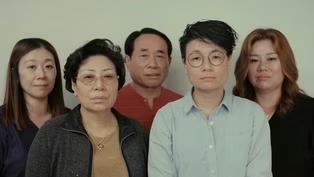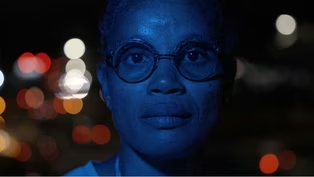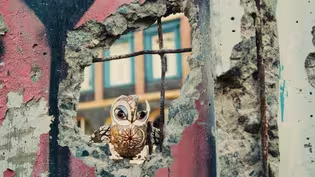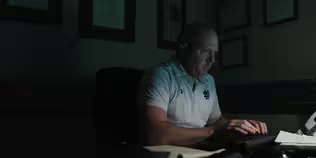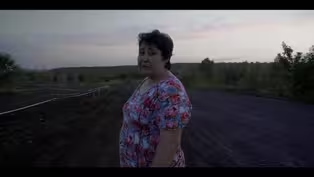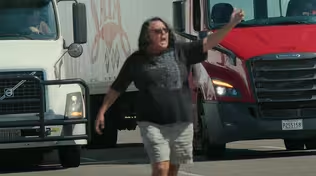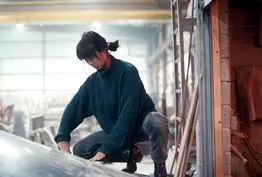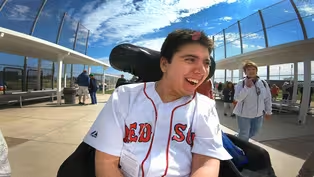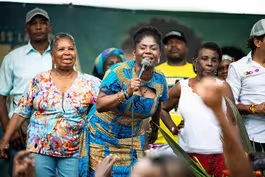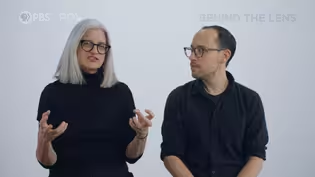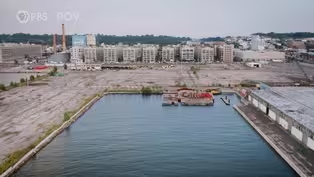
Emergent City
Season 38 Episode 6 | 1h 22m 31sVideo has Closed Captions
A new “innovation district” tests local democracy in a divided Brooklyn community.
Residents of Sunset Park, Brooklyn face rising rents, a legacy of environmental racism and the loss of the industrial jobs that once sustained their community. When a global developer purchases a massive industrial complex on the waterfront and lays plans for an “innovation district,” a battle erupts over the future of the neighborhood and of New York City itself.
Problems playing video? | Closed Captioning Feedback
Problems playing video? | Closed Captioning Feedback
Major funding for POV is provided by PBS, The John D. and Catherine T. MacArthur Foundation, the Wyncote Foundation, Reva & David Logan Foundation, the Open Society Foundations and the...

Emergent City
Season 38 Episode 6 | 1h 22m 31sVideo has Closed Captions
Residents of Sunset Park, Brooklyn face rising rents, a legacy of environmental racism and the loss of the industrial jobs that once sustained their community. When a global developer purchases a massive industrial complex on the waterfront and lays plans for an “innovation district,” a battle erupts over the future of the neighborhood and of New York City itself.
Problems playing video? | Closed Captioning Feedback
How to Watch POV
POV is available to stream on pbs.org and the free PBS App, available on iPhone, Apple TV, Android TV, Android smartphones, Amazon Fire TV, Amazon Fire Tablet, Roku, Samsung Smart TV, and Vizio.
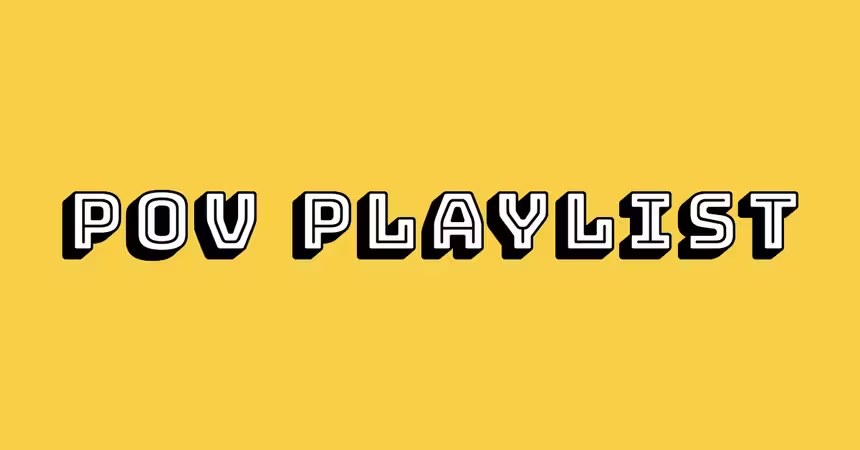
POV Playlist
Every two weeks, we curate a selection of POV docs, old and new, around a central theme. Stream while you can — until the next Playlist!Providing Support for PBS.org
Learn Moreabout PBS online sponsorshipMore from This Collection
POV Broadcast Feature Films.
Video has Closed Captions
A Korean birth mother and her daughter struggle to stay reunited for the long haul. (1h 22m 58s)
Video has Closed Captions
Poet and activist Staceyann Chin chronicles her journey of healing, forgiveness, and mothering. (1h 23m 5s)
Video has Closed Captions
Confronting war, Ukrainian artists pick up arms while finding strength through art. (1h 22m 41s)
Video has Closed Captions
A small-town attorney takes on pharmaceutical giants as opioids devastate his community. (1h 22m 48s)
Video has Closed Captions
An environmental thriller that shines new light on the human cost of coal. (1h 22m 58s)
Video has Closed Captions
In rural Mexico, a community seeks answers, uncovering alarming truths about their water. (1h 14m 47s)
Video has Closed Captions
After losing it all, Desiree Wood takes a second lease on life as a long-haul trucker. (1h 23m 3s)
Video has Closed Captions
A family’s free life in nature is disrupted by tragedy, forcing them into modern society. (52m 53s)
Maya Lin: A Strong Clear Vision
Video has Audio Description
Follow the journey of Maya Lin behind the controversial Vietnam Veterans Memorial in DC. (1h 22m 54s)
Video has Audio Description
A community of disability activists help Samuel Habib, 21, navigate the path to adulthood. (1h 22m 44s)
Igualada: Refusing to Know Your Place
Video has Closed Captions
A Colombian Black rural activist's historic bid for presidency stirs a national awakening. (1h 19m 49s)
Video has Audio Description
Legend of Zelda streamer Narcissa Wright breaks records and finds love in the digital age. (52m 57s)
Providing Support for PBS.org
Learn Moreabout PBS online sponsorship♪♪ ♪♪ [ Water burbling ] ♪♪ ♪♪ [ Click ] [ Birds chirping ] [ Clicking ] [ Click ] [ Clicking ] [ Click ] [ Whirring ] -Brooklyn is a great industrial city with miles upon miles of waterfront.
Ships from all parts of the world move Made in Brooklyn products across the seven seas to lands beyond the horizon.
-Oh!
[ Indistinct conversations ] [ Click ] -Bush Terminal has been operating in Brooklyn at least since 1902.
-What happens to these piers then?
Do they just sit there?
Do you demolish them?
-We have no immediate plans.
They will be dormant.
We would anticipate that the phase out will be completed by the end of 1969.
-What will this mean to the future of New York?
[ Indistinct conversations ] [ Birds chirping ] [ Children shouting indistinctly ] [ Siren wailing in distance ] -¡Juan!
¡Aquí está tu ... torta, guey!
¡Eh, guey!
[ Click, whirring ] [ Whirring stops ] -It's Brooklyn.
2.4 million people.
[ Ding! ]
If it was a city, it would be the fourth largest city in the country.
And everybody wants to live, work, shop, spend money in Brooklyn.
Why does everybody want Brooklyn?
-Come on.
-Look, there's no other place in America that anyone should be, period.
The under-30 crowd is not from New York, and they want to live in Brooklyn because it is the coolest, hippest, hottest place.
-But look at what's happening.
People can't even afford to live in Williamsburg.
That's -- I mean -- -But it's okay.
They move south.
Yeah?
The R train corridor from Union Square to Downtown to Park Slope to Sunset Park.
[ Train rumbling ] [ Indistinct conversations ] [ Car alarm blaring ] -Tía, ayúdame a mover la mesita, porfa.
No, tía, pero un poquito nada más, mi amor.
¿Qué más?
¿Cómo ha estado todo?
-Todo bien, gracias.
-Con calorcito hoy.
[ Speaking Mandarin ] [ Speaking Mandarin ] [ Clippers buzzing ] [ Indistinct conversations ] [ Indistinct conversations ] [ Mid-tempo music playing ] -I am getting it right.
-You are emotional.
Because I'm currently destroying you right now.
I'm like -- I'm destroying you.
-Me llamo Raúl Dávila.
Vivo en Sunset Park 54 años.
-Wow.
-¿Qué es lo que ve?
What do you see?
-Una telaraña.
-A spider web.
-Uh-huh.
-So, we're caught in the web?
[ Light laughter ] We're caught in the web?
-More so that we're working together.
-Oh, okay.
-Juntos.
-Okay?
So, these are why these testimonials are so important -- because they do give you a different, uh -- it gives a face to the cause that we're pushing.
¿Verdad?
Entonces estos testimonios de ustedes son muy importantes porque le está dando una cara a algo que estamos pidiendo, ¿verdad?
Para ellos solamente -- y yo siempre he dicho esto.
Para los dueños es dinero.
Esa es su propiedad, esta es una inversión y ellos están esperando sacarle provecho.
Pero esos son los hogares de ustedes, donde ustedes pasan el tiempo con sus familias.
-You got it.
That's a good answer.
-Me?
-Yeah!
-Gracias.
Gusto de verte.
-Cuídate, ¿okey?
-Bye, se cuidan.
-Bye.
-Nos reímos, ¿verdad?
-Hay que reírse porque sino... What else are you going to do?
All right.
That's everybody, right?
-A group of investors is expected to close a deal in October, giving them control of Industry City.
That's a 16-building complex along Brooklyn's waterfront in the Sunset Park section of Brooklyn.
Who are the investors that are planning to take control of Industry City?
-It's Jamestown, Belvedere Capital, and Angelo Gordon.
-Jamestown -- they have other properties in the city.
Is that correct?
-That is correct.
They're an Atlanta-based real estate investment company.
They used to own what is now referred to as the Google building, 111 Eighth Avenue.
They have a lot of assets.
[ Birds chirping ] [ Indistinct conversations ] [ Up-tempo music playing ] [ Singing in Mandarin ] [ Dog barking in distance ] -Oh, my God!
-Ahh!
-It's still moving?
Okay.
[ Light laughter ] Oh, it's moving!
It's moving!
-I'm scared.
[ Power tools whirring ] [ Ding! ]
[ Click ] -Okay, we're on 3rd Avenue between 37th Street and 36th Street.
And you can see the highway right there, right?
Here's the little alleyway between the two buildings.
The reason we're shooting this is because it's now become very trendy back here.
There's been a lot of money pumped into this space back here.
It's all very interesting.
The question is, what exactly is happening out here?
[ Machinery whirring ] [ Click ] [ Up-tempo music plays ] -We come here to make it.
-To look out over the landscape and transform it.
We are the makers, and the box is empty.
-This is where we fill it.
[ Children shouting indistinctly ] [ Birds chirping ] [ Children shouting indistinctly ] -I'm here pretty much on behalf of my grandparents.
They've always had, like, a real interest in the community.
And so now they're a little concerned.
And, personally, I've never thought about it, never heard about it, and, like, it never crossed my mind, you know?
I'm just, like, a teenager just, like, you know, like, just living life.
And so that's why I'm kind of here.
-I want to thank everybody for coming out this evening.
UPROSE is Brooklyn's oldest Latino community-based organization.
We are committed to making sure community members have a voice in the type of development that occurs in our neighborhood.
So, we all know that just a few steps from here, we can see one of the largest industrial areas in New York City, right along the waterfront.
It has, for many generations, provided accessible blue-collar industrial and manufacturing jobs.
These are jobs that pay twice that of the service sector.
And then we all remember Superstorm Sandy.
And just a few months after this disaster, a major real estate company bought Industry City, the largest private industrial property in all of New York City.
And so they've made clear that they are looking to reactivate their property and ultimately to change the zoning laws, to rezone their property away from heavy manufacturing, to allow for higher-profit commercial, retail, and recreational uses.
When the rezoning kicks off, we are going to be mobilizing community members to turn out at every step of the process.
Should Jamestown Properties succeed in rezoning their property, the types of development that they want to bring to the industrial waterfront will have a devastating impact throughout the entire Sunset Park community.
[ Indistinct conversations ] -Good morning, everyone.
Welcome.
Thank you all for coming.
Today's date is Tuesday, October 24th, 2017, and the time is now 10:00 a.m.
This is the public scoping meeting for the Industry City proposal.
So now I'm gonna turn things over to the applicant team, who will begin their presentation.
-Good morning.
I'm Andrew Kimball.
I'm the CEO of Industry City.
I'm delighted to be here, and thank you for the opportunity.
So, what are the proposed actions that we're looking for today?
We're looking to create a zoning text amendment to establish the Special Sunset Park Innovation District.
And we're looking to rezone a portion of the project area from M3-1 to M2-4, expanded retail, academic, and we're looking for a special permit to allow for a hotel use.
So, with that rezoning -- and this is the value proposition -- capital investments will grow from $250 million today to over $1 billion by 2026.
We'll bring onsite employment to around 13,000, with 7,000 jobs more offsite.
20,000 jobs.
[ Indistinct conversations ] -[ Clears throat ] -Pues de todo este proceso, me siento bien mal, porque es como que estamos -- -No tenemos una oportunidad de realmente... de participar o pelear.
-Sí, hacen ver como que si nuestras voces son escuchadas y todo eso, pero en realidad no es así.
Yeah.
-Pero finalmente, creo que lo que tenemos que tener en cuenta es que Carlos es el que va a tener la última... -La última palabra.
-La última palabra.
-My name is Carlos Menchaca.
I was raised in public housing.
I'm gay.
I'm Latino.
I'm Mexican-American.
I'm proud of my heritage.
[ Cheers and applause ] And it's for all these reasons that I'm here before you today to announce my bid to run for the city council seat in the 38th District and be your leader.
[ Telephone rings ] And this I can just put... -So, we're still on the themes... -Yeah.
Totally.
-...we discussed when we sat together, right?
-Yeah.
Zoning.
[ Laughs ] Zoning.
It all comes down to zoning.
Okay, so, here's how I'm understanding it.
And this is a continued conversation with all the stakeholders that are gonna be part of bringing forth a decision and next steps around Industry City.
We are trying to maintain a commitment to an industrial working waterfront.
We're seeing this across the entire city, where these massive international conglomerate companies are actually coming in, purchasing property, and then reselling it with hopes of speculation that something might change in the future that will allow upzoning, that will allow changes in land use.
Now, some of the ideas that Industry City is coming to the community with represent a possible dismantling of that zoning for preserving our manufacturing.
[ Machinery whirring, clicking ] -All over the United States, communities are looking to shut down the industrial sector because it's killing them.
Here in Sunset Park, we've had to think about, how do you retain the working-class character of the community?
How do you keep it a walk-to-work community and keep it industrial?
But not at the expense of our lives.
And so even while you're seeing, like, scrapping metal and things like that, those we consider stakeholders and community partners, and we try to bring them into the conversation about how we engage in that green re industrialization.
And then to the left, you're gonna see Industry City.
And you can see -- you can see gentrification all over it, everything from the avocado toast that they serve to the yoga mats.
So, this is what they see for the industrial sector, and what we see is a place where there is manufacturing for climate adaptation, mitigation and resilience.
[ Sea gulls squawking ] We see those rooftops, and we see community-owned solar.
We see these alleys, and we see bioswales.
[ Click ] Our communities are reluctant hosts to all of the environmental pollution and infrastructure that is harming our communities.
We are here today because it is those people who least contribute to climate change that are the ones that are going to be most impacted by what's coming our way.
[ Cheers and applause ] I travel all over the country and different parts of the world because I'm part of the climate justice movement.
But wherever I come home, it feels like... Like, literally when I'm in the plane hovering above New York, I just want to hug it.
[ Horns honking ] It's -- You know, it's part of my rhythm.
-¿Sí?
-Tres de coco y dos de cherry.
-Okay.
Ya bajo ahora.
-And now my rhythm is considered outside, that needs to be managed and controlled.
[ Laughter ] I talk too loud.
I talk too fast.
I listen to my music too loud on Saturday afternoons.
Like, I had this one woman once, and she said "Can you turn that down, please?"
And I said, "No.
I won't do it.
It's Saturday.
It's not a weekday."
She goes, "But it's loud."
I said, "Yes, it is.
Yes, it is."
So, yeah, It's New York City.
-♪ Hit different ♪ -♪ Hit different ♪ ♪ When I'm on the mic, you know that it felt different ♪ ♪ If I get ya happy, you know that I get... ♪ -But that's changing.
That's changing.
We're supposed to be civil.
And so that civility, that thing they call civility, being quiet, that homogeny -- that is a very violent act.
It's literally the marginalization of the most needy, the evisceration of a culture, the elimination of a people.
That's violence.
And it's been violent for generations, but it's particularly violent now.
-Go.
Go, Shorty.
[ Up-tempo music playing ] ♪♪ Go!
-In 1941, about 80% of the olives that were consumed in the United States came out of here.
And that is just one idea of how transnational this space was.
What you're gonna see here today is Jamestown Properties' adaptive reuse of this space.
We're gonna go ahead and get back inside now, and we're gonna visit our first tenant.
[ Indistinct conversations ] -Walking down here on 36th Street, I mean, it's really gritty.
It still has a grittiness that Manhattan has lost.
-Yeah, we're gonna talk about that a little bit.
Um, you're not gonna see that as much inside, but it's really an oasis amongst a working-class community.
[ Conversations continue ] -Hi!
We're coloring today.
When was the last time you colored?
You can make up whatever you want.
Anything goes.
And then we also have mandalas or butterflies.
Get creative.
Get that creative juice flowing.
-All right.
-Industry City campus activation.
[ Indistinct conversations ] -Camp David is a private club.
It's like a social club.
To rent a desk there, a floating desk, is $700 a month.
But it includes conference, coffee, lemon water.
So, we're gonna scoot right in here, to the bakery!
-Everybody's here?
Okay.
We moved into Industry City before the new owners came in.
We benefited from that whole development.
So we'd love to stay here, but, you know, it might not be possible.
Obviously the rents have been going up because of the success of the place.
It used to be extremely cheap.
It's not that cheap anymore.
Now, for media companies that have hundreds of employees in Manhattan, to move here is a huge saving.
[ Doorbell rings ] -There we go.
-Hi!
Yes, come on in.
-Greetings.
Welcome to Evergreen.
This is a project we're working on right now in Columbus, Ohio, and we had to completely recreate the interior of this church.
This is the Apple Store up on Madison Avenue.
We started looking a couple years ago, and Industry City -- there was so much space, and they were willing to build it out for us.
There was a little bit of trepidation.
You know, we didn't -- We wanted to make sure that we weren't gonna lose any employees.
Some of the people in New Jersey ended up moving to Sunset Park.
You know, this is a decent neighborhood.
When you come here, it's like, you know, "Gee, there's this hum in the air.
There's something going on here.
What's --" You know, there's, like, something cultivating.
It's growing.
At the core of it, it's like, "What makes people want to be there?"
And it's a sense of place.
It's not banal.
It's not the mall.
It's not, you know, cookie-cutter.
You know, it has personality.
It has character.
People want that.
They need that.
That's what nurtures their soul.
They're creating it here, and -- and I would say not in an artificial way.
You know, the creatives want to be here.
They're transforming the neighborhood.
And they're succeeding.
[ Power tool whirring ] -Are you a Sunset Park resident?
-This one's English, yeah.
-Okay.
[ Laughter ] -It's about, like -- Industry City is trying to push a rezoning of the industrial waterfront.
It's New York's last industrial waterfront.
And when that happened in Williamsburg and Chelsea and Dumbo, it resulted in, like, displacement of, like, the community of color there.
-I just know that what happened in Dumbo, in Williamsburg, in my opinion, me being an Uber driver there also -- -Yeah.
-It's really nice.
Like, I really like the neighborhood.
Like, just because of that, they opened up an Apple Store.
-Yeah.
-And that's really good to stay in Brooklyn 'cause I don't like to go to Manhattan.
-Okay.
-So I don't know if that's good or bad.
[ Chuckles ] I don't know.
I just don't know.
[ Birds chirping ] [ Indistinct conversations ] -¿Y cuál es el impacto que usted piensa que va a tener?
-La renta.
-La renta va a subir.
-La renta para los inquilinos residenciales, pero también para los comerciales.
-Esta es una preocupación.
-Ellos pueden decir: "Voy a hacer esto y esto por la comunidad", ¿pero cómo sabemos que lo van a hacer?
-Exactamente.
Esa es una buena pregunta.
¿Cómo sabremos que ellos van a hacer lo que dicen?
La experiencia en nuestros barrios es que no han hecho nada de lo que dicen.
-No han hecho nada.
-Entre la comunidad dominicana de Washington Heights.
-En Chelsea, la misma compañía que está...con Industry City rezonificó y luego lo vendió a Google.
-El nivel Community Board es el más cercano a la comunidad.
Le toca al Community Board hacer la revisión de la aplicación y abrir esta conversación al público para que decidamos si sí vamos a apoyar o no vamos a apoyar.
Industry City quieren crear un área de acceso especial para que ellos puedan construir hoteles de lujo.
Bajo la zonificación que existe ahora, no pueden hacer ese tipo de proyecto, ¿verdad?
También son 3.5 millones de pies cuadrados para lo que es la innovación, o la economía de innovación.
Esa es una de las preguntas que tenemos para ellos.
¿Qué significa eso?
[ Click ] -The moderator of our next panel pioneered the Brooklyn Navy Yard project and now leads Industry City, creating a national model for fostering innovation economy jobs and sustainability.
Please welcome Andrew Kimball.
[ Applause ] -Okay, great to be here.
We have a sensational panel and not a lot of time.
Some of the most exciting economic development in the city now is happening along an innovation corridor and includes projects like Industry City in Sunset Park, where I am.
And in large measure, it involves taking big old buildings that once were the hub of 1950s manufacturing, but had really lain fallow for decades, and repurposing them for the innovation economy, a new definition of innovation and making.
This is the first courtyard we did.
There were seven feet of weeds here.
So, we have tech meetups here.
We have makers' markets here.
We have holiday markets here.
So, we're heading up to Motivate.
[ Scanner beeps ] Motivate owns bike-share programs across the country, now across the globe, including Citi Bike here in New York City.
And what's interesting about their space is it really speaks to the innovation economy.
So, again, a lot of the support for all the bike-share systems citywide happen out of here.
So, it's part industrial company, part tech company, part research-and-development company.
And this actually a lease I was very involved with.
[ Telephone ringing ] [ Indistinct conversations ] You know, how your business grew in the neighborhood and why you were willing to come here and try this out.
-Okay, yeah.
A gentleman got in contact with me from Industry City, showed me the space, and it was just like -- it was like a dream come true.
I was like, "Yeah, they contacted me."
So, it was like, we started from there, and it's just -- It was like a snowball effect, and it was like -- it just grew from there.
[ Man shouting indistinctly ] [ Cheers and applause ] [ Up-tempo music playing ] [ Indistinct conversations ] ♪♪ ♪♪ [ Music ends ] [ Man shouting ] La salsa de... [ Cheers and applause ] [ Horn honking ] -I have a lot of friends that are like, "Oh, I went there.
It's so cool."
So it's kind of like, people are getting hip, like, things are changing, and how it could benefit them and they're interested in it.
So it's kind of like, positioning it...
I don't know.
And hearing them out, but then also acknowledging, like, how this is bad and displacing a lot of people.
-We just need to be prepared because City Planning could give notice and the next meeting could be in 10 days, or as soon as 10 days.
So it's just increasingly, increasingly more important that we continue to build and grow our numbers.
-I don't have a lot of experience with zoning battles, but I think it would be helpful for me in talking to other people if I knew of other examples where people had won, as, like, evidence that, like, it is possible to win these things.
And I was wondering if there are any examples that come to mind that would be good to share with people of, like, people winning, you know?
-Um...I feel like unfortunately there aren't many present-day examples of that, to be real.
[ Indistinct conversations ] -Folks, if you haven't signed in yet, please do so.
-'Cause at some point, we're gonna have to -- as a community board, we're gonna to have to vote on the proposal.
-How long have you lived in Sunset?
-Uh, since '92?
-Okay.
Yeah.
-A little... [ Baby crying ] -¿Manzana?
¿Quieres manzana?
-Hola.
Hey, good to see you.
-Okay, everyone.
It's hot in here.
And so the actual temperature isn't gonna help the metaphoric temperature on what, you know -- what this is all about.
I mean, this is messy, this is democracy, and this is what it's all about.
-Industry City was 60% underutilized when we got there.
What do I mean by that?
30% vacant, nobody in it, and 30% boxes, no jobs.
We've only decreased the vacancy by about 5%, but we're moving in the right direction.
That's allowed us to grow from 150 businesses to 450, 1,900 jobs to 7,000.
-Ask the people in Chelsea how Jamestown treated them.
-And in Atlanta!
[ Indistinct shouting ] -Let's hear the objective panel.
-I heard somebody say that we're being paid.
I'm not paid to be here.
I'm a small business owner, and I want to give jobs to people.
I come from Sunset Park.
I am the community.
I just want to work, and I want to employ people.
-One thing growing up seeing is just a whole bunch of opportunities just slip by the neighborhood.
And, um, this is an opportunity.
And I think one of the most dangerous things and the most harmful things for the neighborhood is if we don't, you know, change that narrative of, "That's not for us."
It is.
It is.
We're ready for it.
-Buenas noches.
As you know, the Mexican community, a big part of it is undocumented.
So we will not -- probably not get any benefits from -- from Industry City.
But we know that the rents are gonna go up.
[ Cheers and applause ] And we know -- We know that this year in January, my brother was evicted because a landlord thought that, "Oh, there's gonna be change in Sunset Park.
There's gonna be a rezoning."
Started not taking the rent from my brother.
So right now my brother's family is broken.
He's with my mom with a couch.
Wife and daughter are in Queens.
And my nephew is staying at a friend's couch.
-Year after year, exponentially, the price of a house that I had my eye on Third Avenue a couple of blocks away from Industry City went up.
It was $450,000 when I first looked at it.
The next year, it went up to $800,000, after that, $1.
2 million.
Now it's about $1.5 million, $1.6 million.
-Wow.
-Would you agree that there's correlation between the development that Industry City has and the increased property prices?
-Prices are going up in Sunset Park.
They're going up in Red Hook.
They're going up in the Gowanus.
They're going up in Park Slope.
[ Indistinct shouting ] They're going up in Clinton Hill, all the way up to Long Island City.
And this has been a process that's been going on for more than a decade.
-I have a real simple question for you.
How much money does Jamestown stand to gain financially from this rezoning?
-I have no idea.
And nobody would, okay?
But I can tell you this.
[ Indistinct shouting ] Unless you create -- [ Shouting continues ] -What's the number?
-What's the number?
-What you hiding?
-Other questions?
-It looks to me, if my math is not too funny, that they're making $66 to $95 million a year from their 70% -- -Just for the rents.
-From their 70% used complex.
And I've been working on the -- -Today?
-Today.
And these rents will only rise.
-And with the retail and the commercial, which is the basis of their -- of their rezoning, then that number skyrockets.
The most important thing is that they are proposing a Special Sunset Park Innovation District.
All first floors can be retail, which is gonna change the street dramatically.
It's about new uses, it's about new construction, and allowing hotels through a special permit.
♪♪ [ Ticking ] [ Clicking ] [ Vehicle engines humming ] [ Beeping ] [ Speaking Mandarin ] [ Speaking Mandarin ] [ Speaking Mandarin ] [ Speaking Mandarin ] [ Speaking Mandarin ] -Thank you.
[ Speaking Mandarin ] [ Speaking Mandarin ] [ Speaking Mandarin ] [ Speaking Mandarin ] [ Indistinct conversations ] -The question before us is, what is the future of Sunset Park specifically as we think about Industry City?
[ Speaking Mandarin ] [ Speaking Mandarin ] -There will be jobs created at Industry City.
And to say that our kids are not capable of accessing that opportunity is disingenuous.
Make no mistake.
[ Applause ] -Before Industry City was there, you couldn't park your car there because the rats would come and gnaw at your brakes for the antifreeze.
I don't know if anybody remembers that that.
Before Industry City, you couldn't walk there because of the drug dealers, the prostitution, and all that.
[ Indistinct conversations ] -This scale of capital is going to overwhelm this neighborhood, and it's going to catalyze displacement.
I think that these new developments represent kind of a financial Superstorm Sandy.
-We are handing them the largest industrial land use change in the history of New York City.
-Okay.
Before we get into any business, um... thank you, all of you, for being here today.
This is a group that I've assembled to help advise me on what to do in my role as a council member for the rezoning.
-Currently, under the current zoning, M3-1, they could lease all of their upper floors to commercial office tenants, correct?
-We're definitely gonna start with that, yeah.
-If Andrew decides to lease to Amazon or whatever large office tenant, he can, completely.
-Absolutely.
-So, that's what we're contending with.
Manufacturing zones don't actually require manufacturing.
-The manufacturing piece is the one that's gonna give them the least rent.
That's the whole challenge of an industrial district in the first place.
Residential beats commercial beats industrial.
That's just the story of New York.
-Every new tenant that is publicly posted that I've seen has been an office tenant coming from Manhattan.
-AECOM has made really this very important move to Industry City.
Where else in the world do you have such a valuable asset, such an incredible -- almost blank -- landscape?
And we get to write Brooklyn's future on it.
[ Indistinct conversations ] -Brooklyn has arrived.
And we will always look out to these docks, whether they're here or in Red Hook, and say they made us who we were, but they may not make us who we are going to be.
And we will reach our destiny.
[ Crowd chanting indistinctly ] [ Indistinct conversations ] [ Chanting continues ] -[ Chanting ] Not for sale!
[ Crowd chants ] ¡No se vende!
-Not for sale!
[ Crowd chants ] ¡No se vende!
-[ Chanting ] Sunset Park!
[ Crowd chants ] ¡No se vende!
-Sunset Park!
[ Crowd chants ] ¡No se vende!
-Sunset Park!
-Catastrophic events are heading our way.
And while all of us are working really hard to bring renewable energy, to keep our people out of harm's way, these developers are preventing the largest significant maritime industrial area in New York City from building for a climate future.
[ Machinery whirring ] [ Siren wailing ] [ Indistinct conversations ] -For the Sunset Park neighborhood, a just transition means looking at how we can use the waterfront to adapt to the changing climate, create jobs that actually serve Sunset Park's existing workforce, and transition polluting infrastructures to help us shift from an extractive economy to a regenerative one.
-The problem is that if we lose our industrial spaces, New York City will lose the places where they can build for that climate future.
-Most communities have lost 'cause the corporate-created vision has basically won and the public will has been purchased.
So, mi gente, mucho amor, y los veo pronto.
[ Cheers and applause ] -Was that all right?
-Yeah.
Thank you.
-Okay.
-Eddie and I were like... -[ Laughs ] Give me a hug.
-How you doing?
-Good to see you guys.
-How you doing?
Good to see you.
-What's up?
-So, I'm gonna show you the guts of it, right, just so there's no doubts about what's on the map and what we have planned and...
So, you get a sense here, too, where we've put in the energy-efficient double-paned windows and where it's the tenants of the past, right?
And typically when you see a tenant of the past, if you look on the second floor, like, what's the most common thing you see, is a box and no people.
You know, that was Industry City for 30 years.
Today's makers, innovators -- like, they're all over this.
They're like, "This is authentic.
We want to be part of the next generation of makers."
Like, that's -- that's a big reason for the success.
The challenge is, how do you deal with the infrastructure?
When we talk about the immense expense of bringing all these buildings back to life, like, there's not a better illustration than this corner right here.
-Okay.
Thank you.
-Good to see you.
-Thank you.
Thank you.
-Thanks, brother.
-All right.
-Did you get our last email?
-Hi.
-Hi.
How you doing?
-Good.
How you doing?
-[ Chanting ] -Did you get our last email?
-Sunset Park is not for sale!
-Y hemos salido a las calles a recoger firmas.
Son de la comunidad china, de la comunidad hispana y de la comunidad hipster que está aquí hoy con nosotros.
[ Cheers and applause ] -Andrew Kimball can talk all he wants about providing jobs, about the so-called innovation economy, about preserving manufacturing.
But don't get it twisted.
This rezoning is first and foremost about changing the permitted use of our waterfront so they can jack up the rent so they can deliver returns to their investors.
[ Cheers and applause ] Gracias, thank you, shukran, and xie xie.
Thank you.
[ Crowd chanting "Votar no" ] -[ Chanting ] Juan Carlos, which side are you on?
Juan Carlos, which side are you on?
-Yeah, I mean, is there anyone in this room who right now is saying, "I think 'No' is the best answer, there is no possibility of a 'Yes' to this rezoning, modified in some way, and they just don't want to engage in that conversation?
-I'll engage in the conversation, but I still think that the "no" is something that needs to be thought out more.
The more I think about it, the more I feel like the no rezoning would send a huge message to folks that we are not gonna allow them to come in and make money off of displacing our most vulnerable and our working class.
-It's incredibly valuable to be able to stand up and say no.
I just think everyone, including people in the community, need to know what that means.
-Already, right, they can convert all of their property to tech office, right?
They can convert all the property to entertainment uses.
And they can do the retail that they've been doing, which essentially means the most vulnerable tenants, which are heavier industrial manufacturers, even light manufacturers, are gone.
They're just gone in, if not 2 years, 10 years.
-So, when we say no, let's be ready for office.
And then that's also a gentrification component without manufacturing.
And that's okay, but we have to own it.
Like, if we say no, we have to own it.
If we come up with a model in active engagement with Industry City -- I'm not saying we should, but if we did -- we would still be asserting community power over a private entity in a way that's an example for the rest of the city.
-A goal out of this could be, like, how do you improve community control over this major private asset?
-One strategy that we've thought of is limiting office uses.
We could limit the large-scale retail uses.
To have a housing fund.
Industry City literally contributes money into a fund for the preservation and construction of affordable housing in the community district.
I added at least $50 million here because, you know, it's very expensive to build housing.
-Marcela, is this exciting for you, in terms of, like, how that could be developed?
-No.
All of these things are important, but this isn't gonna mitigate the project and the fact that there's still an influx of people.
-So, what is gonna mitigate the project?
-That's what I'm trying to get at.
Like, I have thought really hard, and I can't come up with an answer.
♪♪ ♪♪ [ Birds chirping ] [ Children laughing ] -So, we have a big presentation on Monday.
And what we want to do is just kind of go through and...
The working group came up with some really great ideas about how we think that there's an opportunity for us to kind of keep working together and -- which I'm really excited about, actually.
-I don't think we're here negotiating numbers.
-No, absolutely not.
-But this number, this minimum number is completely absurd.
I mean, I say that with respect.
-Yeah, of course, of course.
-I mean, so...
It's nothing -- I'm not gonna to negotiate from this number.
-No, no.
We're not negotiating.
-I mean, it's pointless.
-The concept that first and second floors will all have service and retail.
In a future where that is the case, it has fully created this entire campus as a pedestrian-oriented window-shopping mall experience.
-[ Chuckles ] Okay.
First of all, I will push back on the concept of a mall.
That's absolutely not what the proposal is.
You have to block out, as a matter of fact, you know, areas where you want to have retail.
-We don't want to make a mall.
We don't want to build a mall here, either.
It's not our desire.
It's not what -- As Andrew said, we wouldn't be building... -But what's a 900,000-square-foot built-out space?
-What?
-What -- What -- Then what is -- If it's not a mall, what is a 900,000-square-foot retail space?
-What I'm not open to is -- and I don't think you should be open to -- is to artificially restrain things from happening.
That's all.
-That is the entire thing that we're doing, is constraining artificially.
Otherwise, everything would be as of right everywhere.
I mean, there will be limits.
-And I'm saying, yes, we're willing to talk through that.
-Great.
Great.
-I think what we're saying -- and maybe enough for today -- is we're willing to have a conversation.
♪♪ ♪♪ -All right.
[ Indistinct shouting ] -What are we gonna do about it?
We want an answer today!
We want a "no"!
We want him to say "no" to this rezoning!
We want him to say, "Yes, I will protect Sunset Park."
-Do you know etiquette on -- Do you know etiquette on flags, like what should be left and right?
Or should we have them on stage?
Hello.
This is Carlos Menchaca.
Thank you for being here tonight, Sunset Park.
[ Indistinct conversations ] -[ Chanting ] Sunset Park is not for sale!
-Not now, not now.
Let's hear what they have to say.
What we want to do is listen because we don't know what he's gonna say.
We don't want to alienate him.
-Okay.
-If he says something that's... then we disrupt, but first, let's hear him... -Okay.
Yeah.
-...because the thing is, he has power and he has the ability to make a good decision for us and we don't want to alienate him.
That's a strategic decision.
-The space that I want for us tonight is for understanding.
So, overall, we need to create jobs and opportunities to support our families here in Sunset Park.
Well, guess who's talking about this?
Guess who has a vision about this?
That's Industry City.
Industry City has a vision.
[ Crowd murmuring ] Industry City has a vision.
I need you to keep me -- [ Indistinct shouting ] I need you -- -[ Chanting ] Sunset Park is not for sale!
[ Shouting continues ] We have neighbors, including Industry City.
And guess what?
They are our neighbors.
-Industry City is not a neighbor!
-And we have a -- [ Indistinct shouting ] Industry City is a privately owned piece of property.
-[ Chanting ] No rezoning!
No rezoning!
No rezoning!
-Okay.
Thank you.
I heard you.
There are some people in this room that don't want a rezoning.
-The community doesn't want a rezoning!
-Harry, sit down, please.
Sit down.
Should we rezone with the plan that we have in front of us?
[ Crowd shouting "No" ] I agree.
[ Cheers and applause ] No.
No.
No.
We've also done some analysis to ask the question, "What happens when we say no?"
The neighbors that talk to you every single day about their housing situation, the things that we're seeing on climate change, all these things -- I do not believe that we will have any opportunity to impact them from saying no.
[ Crowd murmuring ] We need funding to support tenant organizing.
Let's go to the next slide.
[ Indistinct shouting ] This is an idea that came with UPROSE, connect to solar cooperatives -- -Don't use UPROSE for this!
Don't -- Don't use UPROSE for this!
This is not what we're talking about!
We're talking about industrial jobs that are climate jobs!
That are climate jobs!
Don't play us like this!
Okay, guys, I need for you guys to stand, all of you.
[ Indistinct shouting ] -We're gonna end the presentation, and it's really unfortunate that we couldn't have this conversation.
-[ Chanting ] No rezoning!
-But we're gonna keep having this conversation.
-[ Chanting ] No conditions!
-But this plan is not our plan.
You didn't talk about climate jobs.
You didn't talk about infrastructure.
-I couldn't talk about any of it.
-You didn't talk about any of it.
-Let's talk about it.
-You killed it.
You -- You -- We felt like you caved.
-I don't think so.
-Mic check!
-Mic check!
-This meeting is not over!
[ Cheers and applause ] [ Indistinct conversations ] -Empiecen a hacer llamadas a la oficina del concejal y a decirle que no queremos rezoning.
[ Cheers and applause ] -Después de que recojan a los niños de la escuela.
[ Crowd cheering ] -No se vende Sunset Park!
-No se vende!
-No se vende!
[ Indistinct shouting ] -[ Exhales heavily ] [ Horn honks ] [ Indistinct conversations ] -Hi, everybody.
Good evening.
[ Cheers and applause ] -Upstairs, my mom is actually helping with childcare, so for any kids, right upstairs.
She'll be able to help with that.
-So, where we are right now is, for some people who were there at Carlos's presentation, he proposed, without really talking to much of the community, about doing a community benefits agreement.
So, Industry City is actually five giant multi-billion-dollar corporations.
These are the people that we are dealing with in this negotiation that Carlos Menchaca is trying to do.
We are not dealing with small business owners, local barbershops.
We are dealing with these five billion-dollar corporations and what they want to do with our neighborhood.
[ Birds chirping ] -So, here we are.
-The difficult part in community benefits agreements, the most difficult part by far, is to identify the issues that then migrate into the asks.
And then you can start to negotiate that.
-From our side, it's a bunch of volunteers who are sitting around trying to figure out how to sit at a negotiating table with a corporation that has way more resources than we could ever imagine to have, right?
And because we have a divided community that we have to figure out how to bring along, that requires time.
-This is not the "we."
The organization needs to be formed that's representative, and that almost -- -I respect that you may need time to herd the cats, but it does not have to be a legally binding entity.
-I'm really uncomfortable and concerned about the quality of this conversation.
This is not just a negotiation about a date.
This is the establishment of public trust.
-I know.
Hey, we're not gonna be able to have this conversation.
So let's -- let's reconvene later at another time.
-You're making this a farce.
-Thank you.
-You're making this process a farce.
-No, Jeremy.
-You say you want a community process, and you're having closed-door meetings to negotiate a community benefits agreement.
-Hi, everyone.
Welcome to the District 38's office.
We're going to keep the conversation... -What it appears is that you already have a deal made.
-Yeah.
-That's what the appearance is.
-Oh, there is no deal that's being made right now.
What I'm trying to do is create the conditions so that we can actually get to a situation where we can hold them accountable for the things that we need.
That's what I'm trying to do.
-Who's gonna hold them accountable, though?
Who's gonna hold them accountable?
-Do you believe that?
-You have an interest, too.
Everybody has an interest, so -- Hold on.
Listening -- That's fine.
That's fine.
But there are people who are residents who have other interests, too.
They own businesses on 8th Avenue.
-We're gonna stop.
-Okay, yeah.
I'm not saying I understand your experience.
I understand the position of looking at a massive developer who comes up with a plan and then watching an elected official negotiate for some crumbs.
It's not that this is the ideal scenario.
The ideal scenario is the waterfront is owned by the city and that everybody can be able to choose how to make it work.
That's just not the reality.
♪♪ ♪♪ -Timeline is probably the most pressing feeling of pressure right now.
-We have a date, and we're ready to move forward.
So, if you're asking me to change that date again, for the third time, I don't know if I can do that.
-I just think that there's a -- there's a real difference of understanding.
You're -- You're standing in a space of business.
And the work that the community is doing is defined by the community.
And what we're trying to do here is really build a community, a community-led component.
And -- And that's the framework.
It's just a di-- It's a different -- It's a different sector of understanding.
-I hear you.
I hear you.
I'm asking you to help them understand why it makes sense to move.
[ Indistinct conversations ] [ Click ] -We're here to talk about the certification that came out today with the Industry City rezoning.
I'm super disappointed with the developer for -- for taking the action that they took today.
We're all volunteers.
All 50 of us are volunteers, right?
What we have to do is to give feedback and to vote on whether or not to support this ULURP application.
-Our review as a community board is only advisory, okay?
Whether we like the process or not, it's started.
-Uh, a little thing happened earlier this week.
We actually, at the community board, received the official application.
It was delivered in a very large box.
And not to scare you, but that's 3,000 pages long.
Now, as you know, in 45 days -- I mean, essentially, that's reading a giant novel a night -- we are required to come up with a response to this.
♪♪ [ Indistinct conversations ] -More recently, we've had intensive conversations with the council member and made a slew of additional concessions, including pulling hotels out of the plan, agreeing to preservation of manufacturing space.
-If Industry City wants to develop in Sunset Park, they must do so in context.
They must amend their proposal to incorporate the recommendations of the Green Resilient Industrial District, GRID.
-I urge the Community Board to approve.
This is our community just like it's yours, and I respect your opinion, but respect ours, as well.
-This pile here is a copy of all the testimony that we've received to date.
All of this is actually gonna be inserted into our response.
-Basically, for housing, you need some kind of supply-side solution.
-And we have to also add other things that are actually gonna make it happen.
-Connecting young people to jobs in their own community is pretty critical.
-These are all the problems we have.
We don't need a million square feet of retail, you know, to sit amongst our problems.
-10 more seconds, 15 seconds.
Finish it up.
-[ Sighs ] -Pencils down.
[ Indistinct conversations ] -In between "safety" and the word "and," I'd like to add "accessibility."
-Okay.
-And I'd like to make sure that there's a certain percentage of commitment to green leases.
-After this, I move that we go back to the front.
We are not following the proposed procedure, and that's what's causing the delay.
So let's just do that.
-How long are we gonna stay there?
-Till it's done.
-Till 2:00, 3:00 in the morning, Peter?
-Yes!
-Everyone else?
-Yes!
-Buy a candy bar, take a piss and let's go.
Let's go!
[ Mid-tempo music plays ] [ Electronic whirring ] ♪♪ [ Indistinct conversations ] [ Children shouting indistinctly ] -Hi, Beverley.
It's Marcela from CB7.
How are you?
The vote that is happening tonight -- are you gonna be there?
I'm actually hoping that we're gonna be able to vote "no" and then add all the recommendations that the committees had just to make sure that we show a unified front to both the council member and the borough president.
I appreciate that.
I'll see you later tonight.
-We are not gonna shut this meeting down tonight.
That's not gonna happen tonight.
We have to vote, and that's what's gonna happen tonight.
-Yes!
Thank you.
[ Laughter ] -We'll move on.
All right, this is the seventh inning stretch.
And I will say, when my wife asked me earlier today, "How do you feel?
This is the big night."
I said, "I'm excited."
This is like democracy in action, right?
So -- [ Laughs ] Yeah, exactly, I don't have a wife now.
Hey.
Hey, Deb.
-51 board members, we're all here to service those folks that are not in the room.
I'm going to vote no because, on this plan, I see not one community benefit.
They talk about jobs, but they can't even guarantee that those jobs are gonna go to members of this community.
-This community board has been working on that waterfront for 20 years.
I am not gonna vote no because I do want to see stuff down there.
-To clarify, a "yes" vote is to disapprove.
So, "yes" to disapprove.
-Roll call.
-Jose Aleman.
-Yes.
-Alexa Aviles.
-Yes.
-Anita Bulan.
-Yes.
-Julixa Campusano.
-No.
-David Estrada.
-No.
-Antoinette Martinez.
-Yes.
-Amendment fails.
20 "yes" votes to 27 "no" votes, zero abstentions.
[ Attendees murmuring ] We need to have an affirmative vote for something.
If we don't have an affirmative vote, we've taken no position.
-No decision is really bad for the community 'cause we need to have a voice in this process.
So I would like to give another chance to reopen -- I would like to have a motion to reopen -- to reconsider -- -To wait out older board members so you can vote without them is heinous!
[ Indistinct shouting ] Heinous!
-Folks!
Hey, hey, hey!
Guys, guys!
-You can't reconsider twice.
-Stop.
Please.
-No.
It's a fact.
-Why don't we all take... -All right.
Hey, hey, guys.
-...and treat each other with respect.
-All right.
Guys.
-No, I'm saying it to you as well, sir.
-Okay.
-So, that we will now forward to the borough president for this action a "no decision."
-Does it still go forward to the borough president?
-It does not.
Only the things that we -- -Only those two?
-The issue does.
-I mean, the issue does, right?
So, it'll say... -None of our recommendations go forward.
-So just A44 with none of our recommendations?
Okay.
-Oh.
[ Tapping on table ] -Alright.
-[ Amplified ] What we've entered right now is a process that's set up for us to fail, that's set up for this community to fail.
[ Indistinct shouting ] We're asking Eric Adams -- Well, actually we're not asking him.
We're telling Eric Adams.
[ Cheering ] We're telling Carlos Menchaca to listen to us.
We have a community-led vision and we want to have a seat at the table so we can lead that vision in Sunset Park.
♪♪ -Industry City has come alive thanks to hundreds of local entrepreneurs who have embraced our vision over the last six years.
-And hundreds displaced!
-We're at a fork in the road.
Will our city's leaders support this kind of private sector economic development with practical adjustments to outdated rezoning that lock in and expand the community connections... [ Chanting ] -No, I'm sorry, sorry.
We're closing the hearing.
[ Chanting continues ] ♪♪ [ Siren wails in distance ] -Good morning and welcome to the City Planning Commission remote public meeting.
-I will now call the roll.
Commissioner Burney?
-Here!
-Commissioner Cappelli?
-[ Speaking indistinctly ] -In the matter concerning Industry City, Chair Lago?
-Since March of this year, the city has lost 777,000 jobs.
And with that, I vote yes.
-Commissioner Burney?
-And I vote no.
-Commissioner Cappelli?
-I'm very pleased to vote yes on this.
-And I'm pleased to vote yes.
-Yes.
-Yes.
[ Crowd chanting "Black Lives Matter" ] -Watching the city change, I'm not feeling good about moving forward with this application and this process.
We're in a multibillion-dollar hole overnight.
I mean, it's like you could just start going through, and you used the word impossible.
It potentially could feel and be impossible.
[ Bell ringing, indistinct conversations ] -Nomás estamos aquí para ayudar a la comunidad.
Por eso tenemos suministros escolares.
Si necesitan máscaras, por favor pregunten por las máscaras.
Si sus niños necesitan máscaras, también tenemos mascarillas para ellos.
-[ Laughs ] -It's Wednesday.
[ Laughter ] -Nos vemos.
-You know, today is "Get Tested Tuesday."
We really encourage people if they've never been tested, it's a great day to do it.
-I tried for two years to make a good deal.
And there's no way.
There's no way we get accountability for the things that they're promising right now.
The mayor came in with nothing.
The CBA is nowhere.
They don't have a lawyer.
And there's no way in hell that I'm going to allow this to move forward without all those pieces.
-I'm in such a quandary with this thing because I have a lot of respect for you.
But at the same time, I'm the majority leader and I guess, I guess it's one of those... political statements that people say.
It's like, I guess I'm with you until I can't be with you.
Now, from what I understand, there may be enough council members to override you who are supporting this right now.
[ Siren wails in distance ] ♪♪ [ Cheering ] ♪♪ [ Cheering ] -We could bring all of our allies in the climate justice movement to step deep into this, and they're on board.
-Are there any members of the public who wish to testify on the Industry City proposal?
-Yes, Chair Moya, there are approximately 200 public witnesses who have signed up to speak in total.
-We have really put our heart and soul into looking through this and this application is not for this community.
-You have my written testimony.
We support this rezoning enthusiastically.
Thank you.
-We've been here for 10 hours and I'm disappointed to see that a lot of council members are not even on right now listening to us.
-We want decision-making power over what happens in our neighborhood, which is why we need to be continuing to build for a moratorium on all rezonings.
-But look, folks, it's been a long day.
We've now gone on for 11 hours and 31 minutes.
This meeting is hereby adjourned.
[ Gavel bangs ] [ Mechanical humming ] -The controversial proposal would have rezoned the waterfront in Sunset Park and added thousands of jobs.
-The CEO of Industry City wouldn't go on camera but gave us a statement saying a number of factors forced them to rethink their request to have the property rezoned, blaming the current political environment.
-The developers behind rezoning plans for the sprawling Industry City complex in Sunset Park have decided to withdraw their application... [ Cheering ] ...after a year-long fight over the waterfront swath of Brooklyn.
The decision to abandon the rezoning comes as a growing slate of politicians were coming out against it.
-I didn't get a call from Andrew.
Am I supposed to get a call from Andrew?
Is that what happens?
Like, is he conceding, like an election?
Like, do I get that call?
If he doesn't call, do I call him?
[ Sighs ] [ Line ringing ] -Hi.
You've reached Andrew Kimball.
Please leave a message.
Thanks.
-At the tone, please record your -- -[ Sighs ] [ Sea gulls crying ] ♪♪ ♪♪ ♪♪ ♪♪ -Welcome to Sunset Park.
Industrial waterfront tour.
This is an onshore wind turbine here.
The ones that are going to be built offshore are going to be about twice the size of this one you see here.
This terminal is going to be transformed to be one of the first and largest offshore wind assembly and staging ports in the country.
What's happening here at this port is an example of what is possible with local, state and federal resources coming in to support a community-led vision.
♪♪ ♪♪ [ Applause ] -This is truly a special day for us here at Equinor and for our partners, BP.
We are creating a whole new supply chain that will create jobs right here in New York City.
-The green revolution that we have been envisioning, we've been talking about it so long, and now it feels surreal to have it in our backyards.
♪♪ -Thank you for joining us.
So we're hoping that with this visit that you see what frontline communities are doing, that is complex.
-This notion of green industry, green industrialization -- -Green Reindustrialization.
-Green Reindustrialization.
-That's right.
-That moves us away from extraction, but makes it possible for communities not only to survive, but to thrive.
That's what this is.
And this is replicable.
-What's being done here in this community and with the people that you work with and for is ahead of the curve.
-So what can we do to support your work?
And what is your next step?
♪♪ ♪♪ ♪♪ [ Applause ] -Thank you so much.
[ Scattered cheers ] I'm just super overwhelmed with the amount of support and love that's here right now.
I just want to take a minute to take it in.
-We love you, Marcela!
[ Cheers and applause ] -♪ Banner yet wave ♪ ♪ O'er the land of the free ♪ ♪ And the home of the brave ♪ [ Applause ] Thank you.
-Bureaucracy, inefficiency, and inability to move forward has hampered this city for far too long.
That will not be the hallmark of the Adams administration.
-Mr. Mayor, we're all here because we're inspired by your vision and your understanding that, to bring this city roaring back, we're going to need public-private partnership.
-Could I ask you guys -- We're just doing an interview, just a little bit, all good.
-Extra.
-No, no, no, we don't need extras.
It's just getting a lot on the thing.
Thank you.
-I don't think they're going to listen.
One of them is a wise ass.
It's the guy that wanted to be an extra.
And I know.
I was like, "We got a live one."
Over time, all of our asks just got denied.
We wanted to do dorms.
That was pulled off the table.
Hotels fell.
Constricting the amount of retail that we can do.
Andrew and I and all partners talked about it all the time.
Conference calls all the time.
What are we doing?
Why should we do it?
We're so close.
All that.
And then it just didn't happen, so...
Here we are, you know, doing our thing.
We're still doing all of the things that we did before.
[ Indistinct conversations ] ♪♪ ♪♪ When we took over this project, there were very few offices upstairs, certainly not the type of, you know, office use and creative use that we were going for.
And the only way you can attract people to do that is you have to have a place.
You have to do what we call placemaking.
You have to create something that, when companies are looking for space, their employees are going to like it.
♪♪ It's great that people come and visit -- you want that -- but you want to make sure that people know that they can have an office upstairs.
So this investment is really about the upper floors, Because at the end of the day, we do have to return -- we do have to make a return for our investors, right?
And so we need some things in order to be able to do that.
And so that -- It's just -- It's kind of math, you know.
♪♪ -El bandolón.
El tambor.
El cantarito.
El soldado.
La fruta.
El gorro.
La sandía.
La campana.
El... La rosa.
El alacrán.
El camarón.
♪♪ -¿Estás tomando agua?
Te estás mojando.
♪♪ ♪♪ ♪♪
Behind the Lens: Emergent City
Video has Closed Captions
Clip: S38 Ep6 | 1m 39s | Behind the Lens interview with Emergent City directors Kelly Anderson and Jay Arthur Sterrenberg. (1m 39s)
Video has Closed Captions
Preview: S38 Ep6 | 2m 5s | Trailer for Emergent City by directors Kelly Anderson and Jay Arthur Sterrenberg. (2m 5s)
Providing Support for PBS.org
Learn Moreabout PBS online sponsorshipSupport for PBS provided by:
Major funding for POV is provided by PBS, The John D. and Catherine T. MacArthur Foundation, the Wyncote Foundation, Reva & David Logan Foundation, the Open Society Foundations and the...
